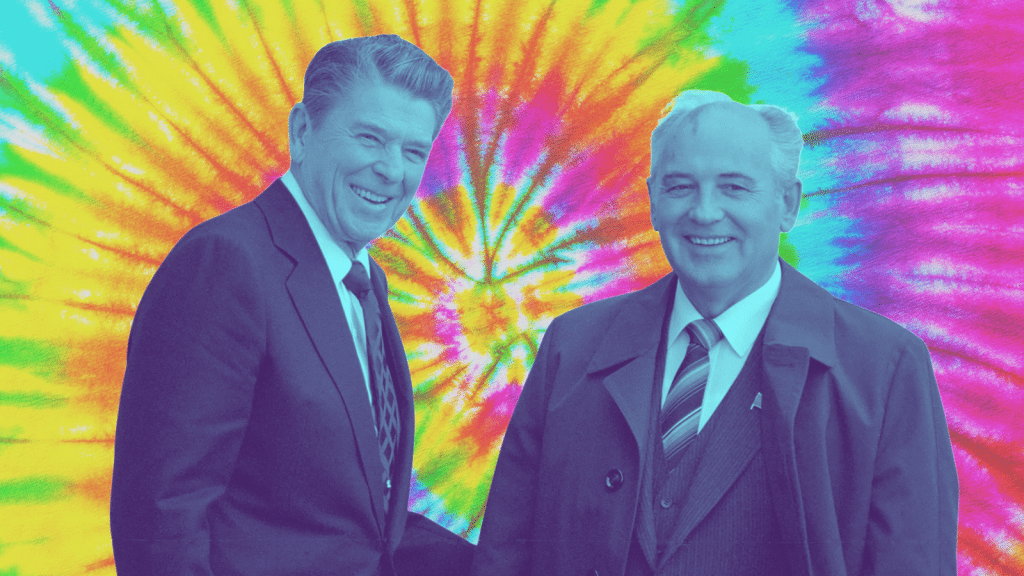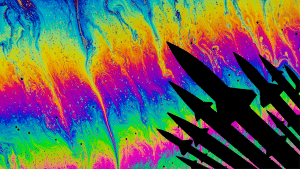Psychedelics: The newest tool in nuclear negotiations?
By Robert K. Elder | December 17, 2021
 Ronald Reagan and Mikhail Gorbachev, illustration by Sarah Starkey
Ronald Reagan and Mikhail Gorbachev, illustration by Sarah Starkey
The plan was simple: Give the psychedelic drug MDMA (popularly known as Ecstasy) to Soviet scientists and military personnel set to negotiate with US President Ronald Reagan in 1985, thereby injecting empathy and cross-cultural understanding into the nuclear peace process.
So, that’s just what Rick Doblin and Carol Rosin say they did—and they still believe introducing psychedelics into nuclear negotiations can produce positive results.
“People have such enormous fears and anxieties that get in the way of really hearing and listening,” says Doblin, 68. “With psychedelics, you can get over these emotional blocks that also block our thinking. Psychedelics can produce a deep reliance on common interests and values.”
In 1986, the year after Doblin provided Rosin with 1,000 doses of MDMA for her trip to Moscow, he founded the Multidisciplinary Association for Psychedelic Studies (MAPS)—a nonprofit that has since become a powerhouse behind pioneering studies on the use of psychedelics for the treatment of PTSD, alcoholism, and mental health issues.
But Doblin credits Rosin as the architect of the plan. Rosin, now 77, worked as a corporate manager for Fairchild Industries, an aerospace manufacturing company. In 1983, Rosin founded the Institute for Security and Cooperation in Outer Space, which advocates for a comprehensive space weapons treaty.
In 1985, she was working as a consultant on space and missile defense issues in Washington D.C. but was also meeting with like-minded people at the Esalen Institute, the California-based nonprofit and coastal retreat that has been a countercultural hub for bringing together academics, scientists, policymakers, and advocates for the use of psychedelics. That’s where she met Doblin.
Most recently, Doblin was featured in Michael Pollan’s 2018 book, How to Change Your Mind, which covers the history and modern renaissance of psychedelic research. The story of MDMA and the Soviets received only a passing reference, so I called Doblin for a fuller explanation.
“The thought was that if they can work through their fears and traumas and feel their connection to humanity, then that might be helpful,” says Doblin, who holds a Ph.D in Public Policy from Harvard’s Kennedy School of Government.
Initially, Rosin was reluctant to talk about their clandestine operation. “I was working in a very great conservative world of aerospace defense. I’m a quiet person. Many people don’t speak out because of the ridicule and discrediting factors,” Rosin says.
“When I heard from you and then Rick, I thought, ‘Now is the time to tell the truth about this,’ ” Rosin says. “I feel a sense of urgency about this now that we’re on the edge of extinction from a myriad of causes.”
Through her work in the defense and aerospace industry, Rosin had both the international connections and—through her friendship with controversial LSD advocate Timothy Leary—the drive to bring psychedelics to world leaders.
MDMA, scientifically known as methylenedioxymethamphetamine and more popularly known as Ecstasy or Molly, is a “drug famous for its ability to break down barriers between people and kindle empathy,” wrote Pollan in How to Change Your Mind.
A few days before the drug became illegal in the US in 1985, Rosin says, she took a suitcase full of MDMA to a friend’s apartment in Moscow. In walked mutual friends with empty medicine bottles, which she proceeded to fill with tablets of Ecstasy.
“It was the most loving, wonderful experience that you could possibly have, because it was in that state of peace and love,” Rosin says. “It wasn’t to get high; it wasn’t to have a party. No. It was about peace, love and healing—and spreading that around the world.”

Reached for comment about the impact of Doblin and Rosin’s covert action, author Pollan said: “I think it’s highly unlikely Rick’s gift reached its intended recipient—surely someone prevents top government officials from taking pills sent by someone in an adversary’s population.”
But Rosin delivered the MDMA personally, she says, subverting officials and sharing the drug with her friends, which included scientists and defense figures.
David Kaiser, author of How the Hippies Saved Physics: Science, Counterculture, and the Quantum Revival, is skeptical that MDMA reached the power centers of the Kremlin.
“To me the story isn’t ‘Ecstasy ended the Cold War’ or ‘Esalen brokered world peace,’ but instead something more like ‘During periods of unusual uncertainty, people, ideas, and institutions that might ordinarily appear to be on the margins can become entangled with more familiar efforts, often in surprising ways,’ ” says Kaiser, a professor of physics and the Associate Dean for Social and Ethical Responsibilities of Computing at MIT.
That said, Pollan contends, “The potential of MDMA to mediate conflict seems to me something well worth researching. We know that the drug opens a space in which people can discuss difficult issues without being defensive, and that it promotes an almost instantaneous bond of trust between people. So I don’t think it’s crazy at all, though admittedly untested in the context of arms negotiations or Mideast peace talks. It’s interesting to think what sort of experiment could test these ideas.
Although Doblin doesn’t know the ultimate impact of his and Rosin’s project, he still advocates for the use of psychedelics in peace talks as a way to bring people together and allow them to see different points of view.
“We’re not saying that the negotiations themselves should be made under the influence of drugs,” says Doblin.
Instead, he suggests integrating psychedelics into a weeklong meeting between nations.

“Whatever decisions you make under drugs should be tentative, and you should review them after you’re down from the drugs,” Doblin says. “It’s more about hearing and listening to the other person’s concerns.”
Doblin was also directly influenced by Albert Einstein and his quote: “The unleashed power of the atom has changed everything save our modes of thinking and we thus drift toward unparalleled catastrophe.”
“So what was he talking about? What is this new mode of thinking?” Doblin says. “And I think it’s the way in which we’re all connected. It’s a more mystical, spiritual sense of connection.”
The ultimate objectives, Doblin says, are mass mental health and cooperation among nations.
He says: “The overall goal is to have a more spiritualized humanity that can, instead of fighting each other, address our common challenges, such as climate change and the rise of authoritarianism.”
Together, we make the world safer.
The Bulletin elevates expert voices above the noise. But as an independent nonprofit organization, our operations depend on the support of readers like you. Help us continue to deliver quality journalism that holds leaders accountable. Your support of our work at any level is important. In return, we promise our coverage will be understandable, influential, vigilant, solution-oriented, and fair-minded. Together we can make a difference.
Keywords: Carol Rosin, Michael Pollan, Mikhail Gorbachev, Psychedelic, Rick Doblin, Ronald Reagan
Topics: Nuclear Risk
















A drug is a drug is a drug. To take a shot of whiskey, to take mushrooms, affects he same parts of the brain. Our phones are now effectively drugs, as we check our phones more than 160X per day, everyday. The recent upsurge in psychedelics popularity, with such influencers like Michael Pollan, the foodie, promoting them leaves out even the dimmest awareness that a huge percentage of us have either a DSM-V diagnosable illness, or addiction. at some point in our lives. : 65% of us, in a large 100,000 Australian study. Its not healthy. People wonder why they… Read more »
“A drug is a drug is a drug. To take a shot of whiskey, to take mushrooms, affects he same parts of the brain.” Wrong wrong wrong. Drugs act in different ways on different parts of the body. ‘Whiskey’ (alcohol) is a depressant. It is not a psychedelic. Do you have the same attitude to vaccinations, to chemotherapy, to pain medication? If you bothered reading the article & related research without your blinkers on, you’d see the potential use of psychedelics is in circumventing trauma & mental/psychological fear & damage so that people can use an alternative & positive experience… Read more »
I was a traveler to the Soviet Union during the 1980s and 1990s and met with fellow travelers to the USSR at Esalen. Although our group (AHP) did not use drugs, we met with Soviets in their apartments in Moscow, Leningrad, and Tbilisi and over the years built personal friendships that moved up the social order to include research institutions. Collaborative projects brought many people together. It’s possible for adversaries to come together for the sake of humanity. In many ways, we were successful with hundreds of Russian and American teachers, professors, students and parents.
I take it you’ve not read Pollan’s book – perhaps you should as he deconstructs the very notion of these compounds being merely ‘drugs’ like any other intoxicant and shows how that belief was deliberately constructed and disseminated. Psychedelics are a unique class of compounds and just as they showed great psychotherapeutic promise in the pre drug-war days, that promise is now being consistently revealed with a litany of research studies and clinical trials. While no substance is a panacea, these class of drugs are being proven to have far more efficacy in treating a broad range of illnesses than… Read more »
My paternal grandfather Leo Zeff dubbed the Johnny Appleseed of MDMA…And my maternal grandfather worked for the department of defense during the Regan administration. Listening to their views on this were always interesting.